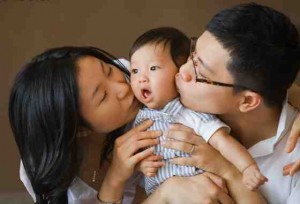After decades of the one-child policy, China will now allow two children for families with one parent who was an only child, its ruling Communist Party said.
The changes were part of a key policy document released by the official Xinhua News Agency on Friday following a four-day meeting of party leaders through Tuesday in Beijing. The document also seeks to map out China’s economic policy for the coming years.
The law currently restricts most couples to one child, with one of the exceptions allowing a second if both parents are only children. Others exempted include ethnic minorities and farmers whose first child is a girl.
The Chinese government credits the one-child policy introduced in 1980 with preventing hundreds of millions of births and helping lift countless families out of poverty. But the strict limits have led to forced abortions and sterilisations, even though such measures are illegal. Couples who flout the rules face hefty fines, seizure of their property and loss of their jobs.
Critics also argue that it has contributed to the gender imbalance in China, where sex-specific abortions remain common. Almost 118 boys were born for every 100 girls in 2012, and female infanticide and the abandoning of baby girls have also been reported.
“The birth policy will be adjusted and improved step by step to promote ‘long-term balanced development of the population in China’,” Xinhua news agency reported, citing the party decision.
Last year, a government think tank urged China’s leaders to start phasing out the policy and allow two children for every family by 2015, saying the country had paid a “huge political and social cost.”
The China Development Research Foundation said the policy had resulted in social conflict, high administrative costs and led indirectly to a long-term gender imbalance because of illegal abortions of female fetuses and the infanticide of baby girls by parents who cling to a traditional preference for a son.





